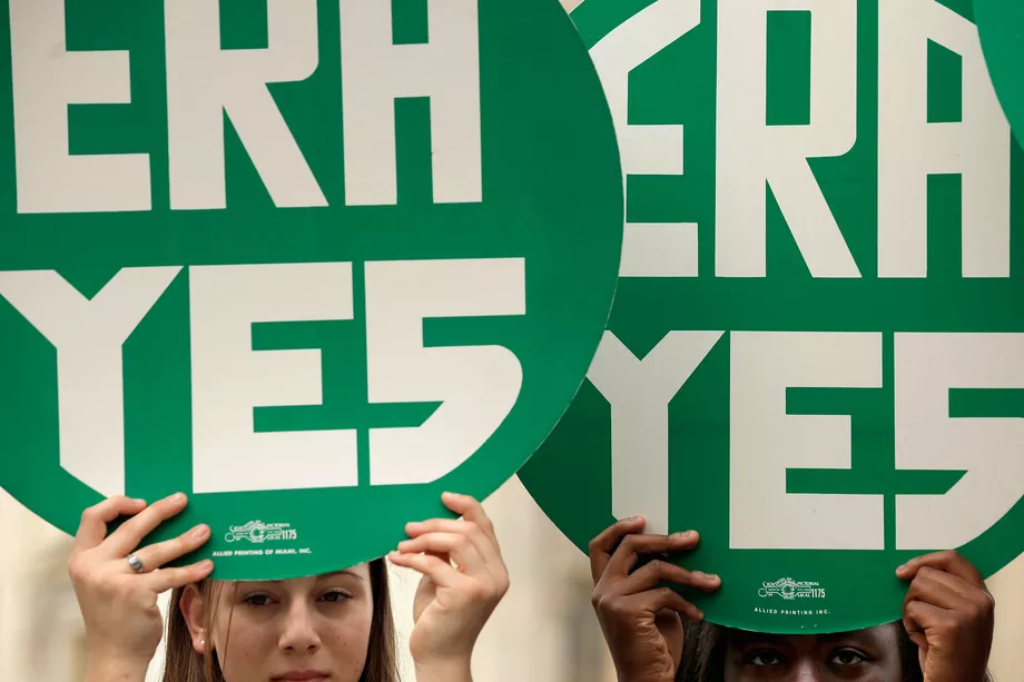Virginia Putting ERA over the Top?
The Commonwealth is about to become the 38th State to ratify the Nixon-era Amendment.

As has been speculated since Democrats took control of both houses of its legislature last November, my home state of Virginia is about to become the 38th state to ratify the Equal Rights Amendment.
AP’s Sarah Rankin (“Virginia moves to brink of becoming 38th state to ratify ERA“):
Virginia on Wednesday moved to the brink of becoming the crucial 38th state to ratify the Equal Rights Amendment in what was seen as a momentous victory for the women’s rights movement even though it is far from certain the measure will ever be added to the U.S. Constitution.
The state House and Senate approved the proposed amendment with bipartisan support, well over a generation after Congress sent the ERA to the states for ratification in 1972. Each chamber now must pass the other’s resolution, but final passage is considered all but certain.
Amendments to the Constitution must be ratified by three-quarters of the states, or 38. But whether this one will go on to become the 28th Amendment may have to be decided in court because the deadline set by Congress for ratification of the ERA ran out in 1982 and because five states that approved it in the 1970s have since rescinded their support.
Doug Mataconis thoroughly explored these issues two months ago in a post titled “A Rebirth For The Equal Rights Amendment? Maybe, Maybe Not.” The short version: Congress approved the ERA way back in 1972 (I was starting 1st grade that year; I have kids in 3rd and 5th grade now—and was 43 when the first of them was born) with a proviso that ratification by 38 states had to take place within 7 years. When the Amendment fell just short, Jimmy Carter persuaded Congress to extend the deadline for three years. Not only did it still not pass, some states actually rescinded their ratification.
Most of us had long considered the ERA a dead letter. Congress tried multiple times over the years to restart the process with a revamped ERA but was never able. But, along the way, more states both ratified the Amendment while a handful rescinded their ratification.
As noted in Doug’s rebirth post and a back-and-forth with erstwhile commenter HarvardLaw92 in a follow-up post titled “Lawsuit Seeks To Preempt Efforts To Declare Equal Rights Amendment Ratified,” the legal questions are less settled than most of us had presumed.
The Supreme Court established almost a century ago in Dillon v. Gloss (1921) that Congress has the authority to impose a deadline on state ratification. Additionally, it simply makes good sense. It’s absurd to consider the ratification by a state legislature in 1972 and one by another state legislature in 2020 contemporaneous.
At the same time, in Coleman v. Miller (1939). the Supreme Court ruled that, if Congress didn’t specify a deadline when passing an amendment, it could be considered open indefinitely. Crucially, they added that it’s up to Congress to decide whether such an Amendment was valid. This came into play with the most recent Amendment to the Constitution, the 27th, which was passed by Congress way back in 1789 as part of the original Bill of Rights—-and not ratified until more than two centuries later, in 1992.
Coleman vs Miller is an incredibly messy precedent because it considered many separate questions and produced multiple concurrences rather than a majority opinion. But many legal scholars contend that Congress can decide to ignore both their own deadlines and the fact that five states rescinded their ratifications. Others argue otherwise.
I find the latter arguments more persuasively legally. More importantly, I think ratifying the ERA decades after its apparent death would be unseemly and undemocratic.
If the 2020 election goes the way of 2018, it’s quite possible that we’ll have a Democratic President, House, and Senate roughly a year from now. If they believe we need a Constitutional Amendment declaring women equal citizens under the law, they should pass it and send it back to the states for a clean ratification. It would almost certainly pass. (And, yes, I’m aware that the President has no formal role in the Amendment process. But, certainly, a President Elizabeth Warren or President Joe Biden would be more helpful in securing passage than a second-term President Donald Trump.)
Beyond that, the ERA was a creature of a long-ago era. While there are obviously still hurdles to overcome, women have long since become full economic and political citizens. Discrimination on account of sex has been banned by both statute and judicial Constitutional interpretation for decades.
Indeed, we’ve long since reached reductio creep on sex discrimination. I’m old enough to remember Phylis Schlafly and others warning that, if the ERA were to pass, women would be serving in the infantry, men would be marrying men, and even gender-segregated bathrooms would be illegal. Those things have, of course, become reality. And the Republic still stands.
Furthermore, as some commenters on the aforementioned threads noted, the 1972-era language could ostensibly cause real damage to LGBTQ rights. We’ve moved past a binary conception of sex and gender. Again, the solution is the same: If proponents believe an ERA is necessary to protect women and others from a future President Trump. pass a modern version through the normal process.



Let me be the first (likely not by the time I finish typing) to express pleasure at seeing you here in this bright new year. Now I shall read your post, searching diligently for something to snark about so it’ll feel like hime.
Hello James. I hope you and yours are well.
Yes, it is good to hear from you, James. I pretty much accept Doug Mataconis’ legal analysis. States have every right to rescind ratification, right up to the point where there are 38 ratifications and it becomes law. Then they don’t.
As to the deadlines, there’s more wiggle room there, but not a lot.
As to the core issue, I’d be happy to see it passed. And yet, I feel the 14th amendment jurisprudence has already covered most of this territory. For instance, Obergefell uses sex discrimination as part of its process.
@gVOR08: Dang, failed to find anything to snark about. Completely agree. And it’s heartening to see you say there’s a chance of Ds taking the Senate.
I’m chuckling over your penultimate paragraph. Yes, I remember those things, too. Nothing turned out to be as earth-shattering as they thought it would be.
@Jay L Gischer:
I agree wholeheartedly. For a contrarian perspective see the hysterical pearl clutching from Rod Dreher over at The American Conservative, who believes the Republic has fallen but simply has not yet hit the ground and it is best for all truly religious to move into like minded communities to weather the storms to come.
@MarkedMan: Separatism has always been a thing in religious communities. Usually it ends in either irrelevance or ruin. How many Shakers are there? How much impact do the Amana have on the culture these days?
The Mormons went separatist, but the experienced a lot more actual persecution than Protestants and Catholics do.
@Jay L Gischer:
“The Mormons went separatist, but the experienced a lot more actual persecution than Protestants and Catholics do.”
Dreher would disagree. The thought that his co-religionists could be forced to treat gays as equal citizens is far worse persecution to him than anything others have endured.
@Jay L Gischer:
I can’t think of a single instance in history where a country, kingdom, empire, or nation decayed as a result of recognizing the equal natural rights of more citizens or residents.
James,
I am not as sanguine as you that the successful attainment of human rights by women are permanent. Many of the rights you have discussed came about by judicial fiat. Considering the rightward tilt of the Supreme Court as well as the reminder of the federal judiciary, future courts could well erode or abrogate those rights previously attained. For example most observers of the Supreme Court consider Roe to be at peril.
Only a constitutional amendment can assure the these successes are permanent.
Everybody has seen those photos that purport to be women in Iran dressed in a very cosmopolitan fashion before the 79 revolution, versus burkas afterward.
@Kathy: maybe whoever downvoted that comment can provide an example for us. I doubt it.
@a country lawyer:
Maybe. But I don’t see how passing the ERA would preclude overturning Roe. Or, for that matter, prevent an ideological court from ruling narrowly. Remember, Jim Crow persisted for generations despite the passage of the 14th Amendment. Indeed, the infamous Plessy v Ferguson decision (“separate but equal”) came less than 3o years after the Amendment’s passage.
That seems like a long time. Sometime soon they might get around to approving the Treaty of Ghent.
@James Joyner: True enough, James. But while Brown v. Board of Education, which relied upon the 14th Amendment, was the opening shot in the campaign which brought down the Jim Crow laws of the Old Confederacy, it was the Civil Rights Acts and the Voters Right Act of the 60’s that dealt the death blow to those laws. Admittedly these were statutes and not constitutional amendments. Nevertheless legislative acts drastically limit the powers of courts to craft their own interpretations.
@a country lawyer:
Congress passed many of the protections in the Civil Rights Act of 1964 in the Civil Rights Act of 1875. The Supreme Court ruled that law unconstitutional in the infamous Civil Rights Cases.
The Supreme Court has an inordinate ability to shape the law—so long as we go along with their rulings. They have rather consistently ruled that the protections in the 4th and 5th Amendments are exceedingly narrow while at the same time finding unenumerated rights like “privacy” hiding in the shadows of other Amendments.
@a country lawyer:
Same here. Just look at how well African Americans did during Reconstruction, and how things spiraled down for them shortly thereafter.
Laws and even constitutional amendments help, but the most important thing is to keep a culture that accepts all people as equal. Women, racial minorities, religious minorities, ethnic minorities, sexual minorities , etc. And not just lip service, but sincerely held.